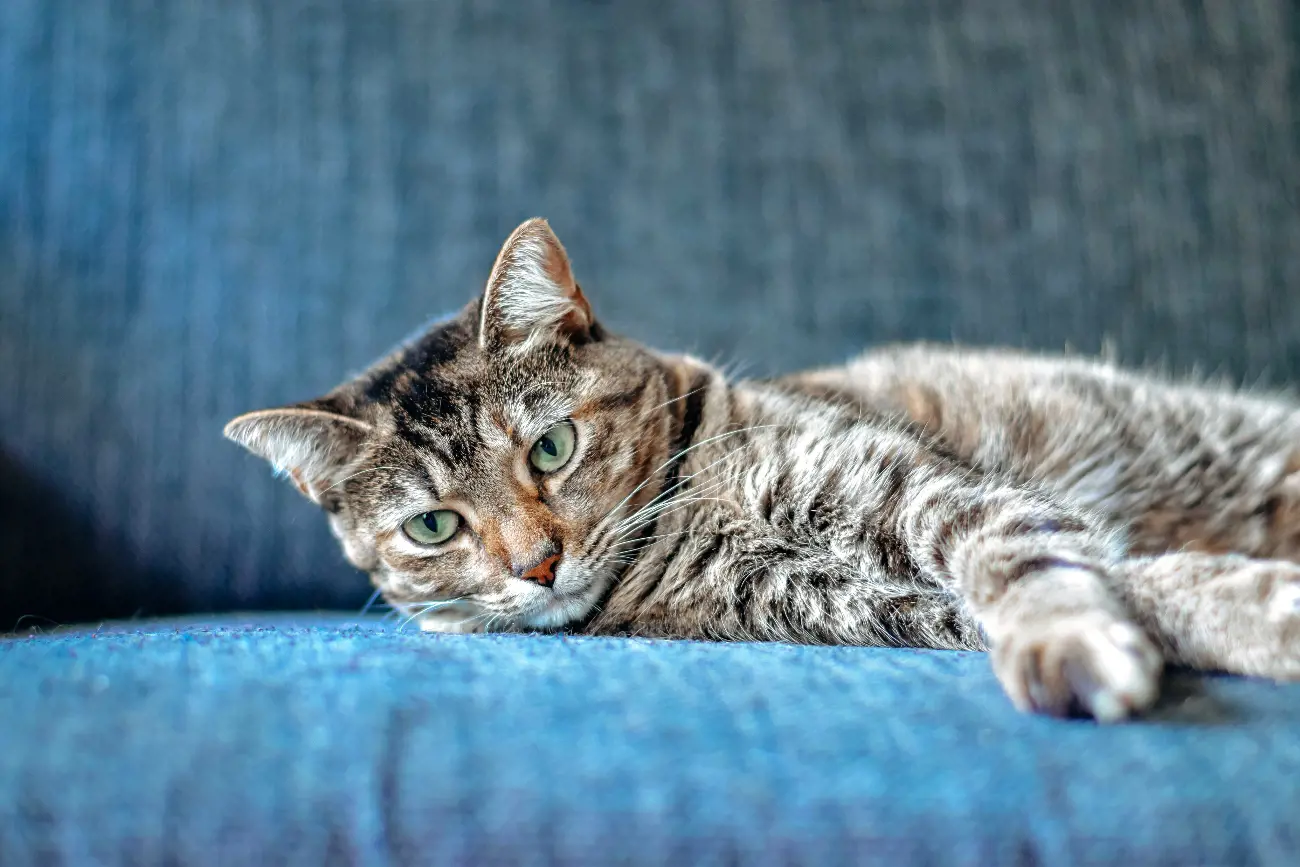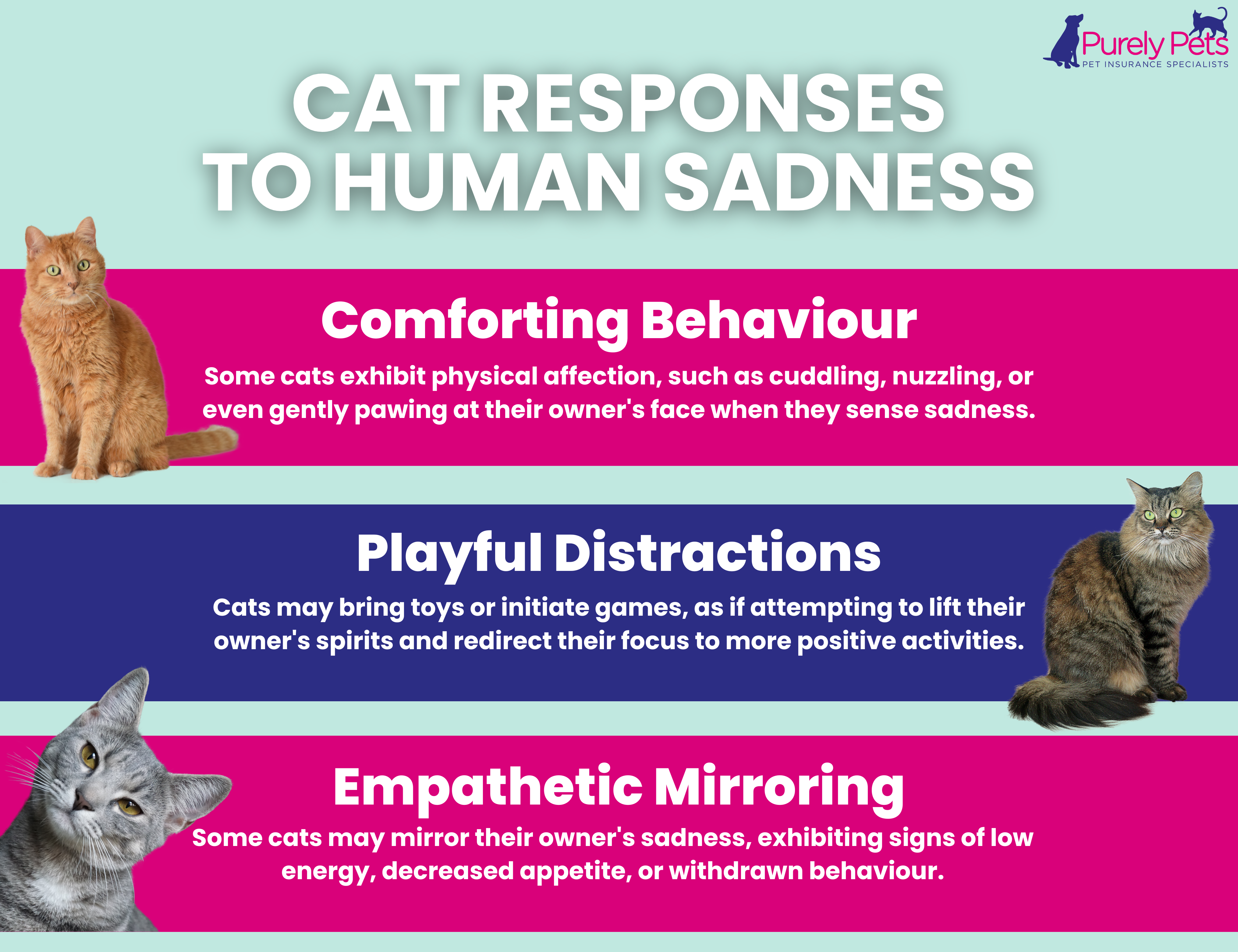Comforting behaviour
Some cats may exhibit comforting behaviour when they sense their owner's sadness. This can manifest in physical affection, such as cuddling, nuzzling, or even gently pawing at their owner's face. These gestures are often accompanied by soothing purrs, as if the cat is attempting to calm and reassure their human companion.
Increased attention and proximity
Other cats may respond to their owner's sadness by seeking increased attention and proximity. They may follow their owner around more closely, meowing for attention, or even insisting on being held or petted. This behaviour could be an attempt to provide emotional support or simply a desire to be near their beloved human during a difficult time.
Playful distractions
In some cases, cats may try to distract their owners from their sadness by engaging in playful behaviour. They may bring toys or initiate games, as if attempting to lift their owner's spirits and redirect their focus to more positive activities.
Empathetic mirroring
Interestingly, some cats may even mirror their owner's sadness, exhibiting signs of low energy, decreased appetite, or withdrawn behaviour. This empathetic mirroring could be a manifestation of the strong emotional bond between cat and owner, with the cat experiencing a form of shared distress.
Cat insurance considerations
Our feline friends are adventurous and curious, often leading them into unpredictable situations. While we love their adventurous spirit, it can also lead to unexpected illnesses or accidents.
To get a cat insurance quote for your furry friend you can get a quote through our website. If you would like to talk to one of our cat insurance team, you can get in touch with us on 0330 102 5748.
Science behind feline emotional intelligence
While the idea of cats comprehending human emotions may seem far-fetched, scientific research has shed light on the mechanisms that enable this remarkable ability.
Cognitive abilities and social awareness
A 2020 study on emotion recognition in cats, has explored how cats possess a level of cognitive complexity that allows them to develop social awareness and form intricate bonds with their human companions. They have the capacity to recognise individual humans, remember past experiences, and anticipate future events based on learned patterns. This cognitive flexibility enables them to interpret and be smart when responding to human emotions.
Evolutionary adaptation
The ability to comprehend human emotions may have evolved as an adaptive trait in domesticated cats. By recognising and responding to their owners' emotional states, cats could have enhanced their chances of survival and secured a more harmonious coexistence with their human companions. This evolutionary advantage may have reinforced the development of emotional intelligence in felines over generations of domestication.
Benefits of feline emotional support
Beyond satisfying our curiosity about feline behaviour, understanding a cat's ability to recognise human sadness can have profound implications for our emotional well-being.
Companionship and comfort
For many individuals, the presence of a feline companion can provide a sense of solace and comfort during times of sadness or distress. Knowing that our cats can perceive our emotions and respond with affection or playful distractions can be a source of comfort and emotional support.
Stress relief and mental health
Interacting with pets has been shown to have positive effects on mental health, reducing stress and anxiety levels. When cats demonstrate an understanding of our emotional state and offer companionship, it can alleviate feelings of loneliness and promote a sense of calm and well-being.
Strengthening the human-animal bond
By acknowledging and appreciating a cat's ability to comprehend human emotions, we deepen our connection and strengthen the bond with your feline friend. As a cat lover, this mutual understanding and empathy can foster a more fulfilling and rewarding relationship, benefiting both the cat and the owner.
Recognising feline emotions
While cats may be adept at recognising human emotions, it's essential to remember that the reverse is also true. As responsible pet owners, we must strive to understand and respond to our feline companions' emotional states.
Signs of feline sadness or distress
Just as cats can detect our sadness, they can also experience their own emotional challenges. Signs of feline sadness or distress may include decreased appetite, lethargy, excessive grooming or lack of grooming, hiding or withdrawal, and changes in vocalisation patterns.
Addressing feline emotional needs
If you notice signs of distress in your cat, it's crucial to address their emotional needs promptly. This may involve providing additional enrichment, minimising environmental stressors, or seeking professional guidance from a veterinarian or animal behaviourist. By being attentive to our cats' emotional well-being, we can foster a deeper understanding and strengthen the bond between us.
Conclusion
The question of whether cats know when you're sad has captivated pet owners and researchers alike. Through scientific exploration and personal experiences, it has become evident that cats possess a remarkable ability to comprehend and respond to human emotions, including sadness. This emotional intelligence is rooted in their cognitive abilities, evolutionary adaptations, and finely tuned senses.
By recognising and appreciating this aspect of feline behaviour, we can deepen our connection with our feline companions and foster a more fulfilling relationship. Additionally, understanding the emotional support that cats can provide can contribute to our overall well-being and mental health.
As we continue to unravel the mysteries of the feline mind, one thing remains clear: the bond between cats and their human companions is a profound and multifaceted one, enriched by mutual understanding, empathy, and a shared emotional journey.






